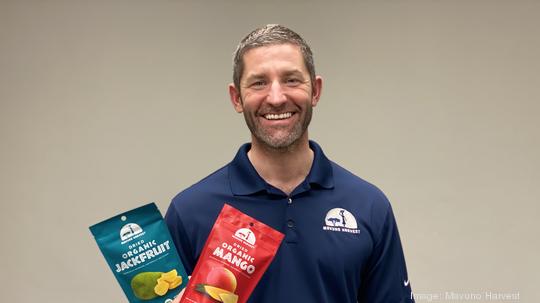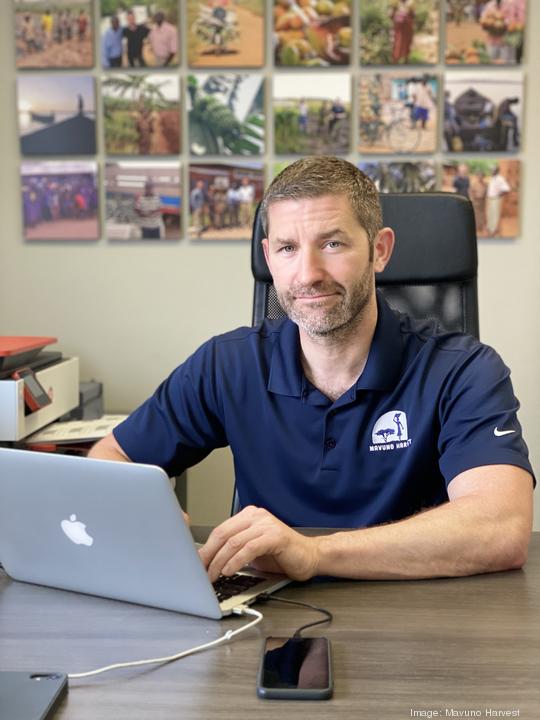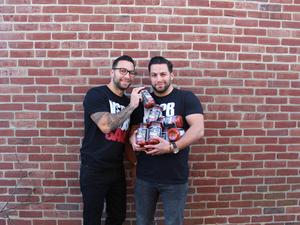
With a focus on Greater Philadelphia small businesses and entrepreneurs, "The Creators" is a weekly feature presented by PHL Inno. Check back each Monday for a new profile on a local business. Have a story you think we should know about? Email associate editor Lisa Dukart at ldukart@bizjournals.com.
Revenue at Mavuno Harvest was up nearly 22% in 2021, with the company exceeding $4 million for the first time.
That kind of trajectory has been steadily growing over the past few years, when founder and CEO Phil Hughes estimates the dried fruit company became profitable. The Covid-19 pandemic caused the Philadelphia company’s online sales to skyrocket in the early days of the outbreak when competitors couldn’t keep up with demand. Such revenue growth landed Mavuno at No. 22 on the Business Journal’s 2021 Soaring 76 list of the fastest-growing companies in the region.
That’s a long way from when Hughes founded Mavuno in 2011 and an even longer way from when he first dreamed it up in the mid-aughts.
The idea for Mavuno — the word means harvest is Swahili — came to Hughes after he spent 2003 through 2005 volunteering with the Peace Corps in Kenya. Based in the village of Miti Mingi about a two-hour bus trip from the nearest large city of Nakuru — he saw first-hand a struggle many farmers in the region faced. With fruit trees yielding a harvest in quick succession and so far from the markets, large portions of crops couldn’t be sold at market value or at all before spoiling.
“It's this naturally growing economic asset that small scale farmers have … and they're just really unable to fully realize the full economic power of those assets,” Hughes said. That’s when the idea for Mavuno first sparked.
But it was years before Hughes, an East Falls native, really put that concept into action. After the Peace Corps he returned to the U.S., eventually earning his MBA at the Fox School of Business at Temple University and working jobs in construction and later production at Tastykake.
A series of events — being laid off from Tastykake, having knee surgery, and having recently purchased a home — set off a chain reaction that led to founding Mavuno. In 2011, on a trip to Florida to see the Philadelphia Phillies in spring training, Hughes and his father got to talking about what direction he wanted his life to take and Hughes decided he would pursue this business venture.
“I didn’t have anything to lose,” he said. “It was actually a really good time for me to start a business.”
Wanting to support him, Hughes’ father offered to invest $10,000 to get Mavuno off the ground, he said. Coupled with $20,000 of his own, Hughes launched the business later that year.
There was a steep learning curve in those first months. “I didn't know anything about the industry,” Hughes said.

The months after starting Mavuno, Hughes spent time researching packaging, importing and exporting practices, and storage capabilities. He then took a six-month trip to Sub-Saharan Africa where he connected with suppliers that had a network of farmers, plus facilities where they dried fruit. That helped him focus in on how the business would operate – by importing dried fruit from Africa and packaging it in the U.S.
Doing so meant he didn’t have to set up his own operations and fulfilled his desire to support the communities by providing a steady buyer for farmers by purchasing their products.
The company is currently undertaking a survey of those associated with its business in Africa to see what the economic impact has been. Its preliminary findings are that income for farmers and those drying the fruit in Africa are 23% higher than their neighbors, the company said. One of its partner organizations has also offered trainings with farmers, resulting in a fruit rejection rate of 3.5% compared with 7.5% that other farmers experience. Mavuno fruit is supplied from over 3,000 small-scale farmers across Africa, including Algeria, Burkina Faso, Cote d'Ivoire, Ghana, Mali, Sri Lanka, Tanzania and Togo.
Mavuno launched its first products — dried mango, pineapple and banana — in the first half of 2012. Those fruits are still available today and the company has since expanded to 16 total products that include nuts and fruit bites. Its most recent addition was organic dates from Algeria. Despite the many products, mangoes remain the most popular, accounting for about a third of all sales, Hughes said.
Mavuno’s first sale was to the Swarthmore Co-Op, followed by Weavers Way Co-Op, which has locations in Chestnut Hill, Mount Airy and Ambler. Today, Mavuno products are stocked in large retailers including Whole Foods Markets throughout the Mid-Atlantic, and numerous grocery stores across the U.S., including Giant, Stop and Shop, Fresh Market, Wegmans and Publix. Its products are also sold online at Amazon and Thrive Market. Collectively, online sales make up about a third of the company’s business, with the remaining coming from wholesale distribution.
Growth has been steady, with Hughes self-funding the endeavor and turning to friends and family for capital along the way. Since turning a profit several years back – the company reported revenue of $1.75 million in 2018, $2.4 million in 2019 and $3.28 million in 2020 — it has turned to debt for funding as needed.
The company, which has a warehouse in Philadelphia, looks to continue that growth, but Hughes is cognizant of doing so in a sustainable manner, preferring incremental gains to so-called hockey stick growth. His goal for revenue gains is around another 20% this year.
As with the business, he continues to look for ways to support agriculture in Africa and is now in the early stages of conceptualizing a grant fund. Fittingly, the goal is to work with Peace Corps volunteers in Africa to deploy funding in support of small-scale agricultural endeavors.
Why the Peace Corps?
I graduated [the Catholic University of America in Washington, D.C.] with a degree in mechanical engineering. And then I got out of college, and I suppose I had a lot of unfulfilled wanderlust. … I saw Peace Corps as an opportunity to do two things: One was have an adventure and two was help people. … Once I actually got into Peace Corps and actually did something, worked and accomplished something that actually helps people, then I realized that it's actually a pretty addictive feeling.
How do you decide on your product pipeline?
We have to be smart about it. Basically when we're thinking about adding a product, there's a couple of factors. Number one is sourcing — does it do some good in the world by the way its sourced? And then number two, does it fit in with the brand? Is it healthy? Is it organic? Is it a snack food? And is this product going to sell?
What’s the potential Peace Corps grant going to look like?
We want to create a grant fund. We haven't figured out all the logistics on this, but it's going to be specifically targeted at agricultural projects in Africa. It can be super small scale, it doesn't matter. And what we will do is we will offer this grant to Peace Corps volunteers in Africa, and they can apply for the grant. … It's like super small-scale VC.
How has the pandemic impacted Mavuno in terms of supply chain?
I talked to a bunch of other people in the industry in March of 2020, as soon as this happened, and everybody was like supply chains are going to get ruined. And so I ordered up. Somehow we never run out of inventory. I don't know if it was luck or planning or what. Everybody else was running out. … And we were able to actually make a lot of gains because a lot of our competitors would run out and people would purchase from us.







